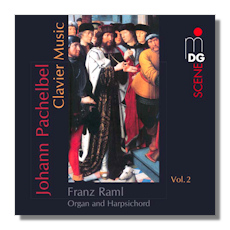
The Internet's Premier Classical Music Source
Related Links
- Pachelbel Reviews
- Latest Reviews
- More Reviews
-
By Composer
-
Collections
DVD & Blu-ray
Books
Concert Reviews
Articles/Interviews
Software
Audio
Search Amazon
Recommended Links
Site News
 CD Review
CD Review
Johann Pachelbel

Keyboard Works, Volume 2
- Prelude in D minor, T. 222
- Fantasia in G minor "Dorian", T. 255
- Toccata in G minor, T. 246
- Magnificat Fugue septimi toni #4
- Toccata in G minor "Dorian II", T. 244
- Ricercare in C minor, T. 292
- Chorale Variations "Ach, was soll ich Sünder machen?", T. 85
- Ciacona in F minor, T. 206
- Chorale Prelude "Vom Himmel hoch da komm ich her" I, T. 6
- Chorale Prelude "Vater unser im Himmelreich" II, T. 62
- Suite in F Major, T. 310
- Fantasia in D minor "Dorian I", T. 252
- Allabreve in D minor
Franz Raml, organ & harpsichord
Dabringhaus & Grimm MDG6141553-2 61min
Born in Nuremberg in 1653, Johann Pachelbel was one of the most famous organists of his time. He received his initial training in his hometown prior to studying with Johann Caspar Kerll in Vienna. During his career he assumed many important posts, such as that of assistant organist at St. Stephen's, and his fine reputation saw him acquiring pivotal appointments at Eisenach, Stuttgart and Gotha. He served at St. Sebald's Church in Nuremberg until his death in 1706.
Pachelbel's compositions were shaped by his friendship with the Bachs and influences from Buxtehude as well as by the works of Froberger. The Fantasia in G begins with the identical chord series as Froberger's Toccata VI, and the three-part Ricercare in C may somehow also be regarded as a homage to this inspired model. The Harpsichord Suite in F also owes its language to the Froberger tradition, while the famous and magnificently dimensioned Prelude in D and the Magnificat settings are marvelous creations in their own right.
Franz Raml, who is a powerful advocate of this music, performs spellbindingly both on the Silbermann Organ in Freiburg and the Bernhard von Tucher Harpsichord, and his beautifully shaped organ registrations and sure sense of tempo allow the music to come to life with balmy freshness. Sound, notes and presentation are in the best MD&G tradition. This is a sumptuous second volume that augurs most splendidly for the rest of the series.
Copyright © 2010, Gerald Fenech.





















